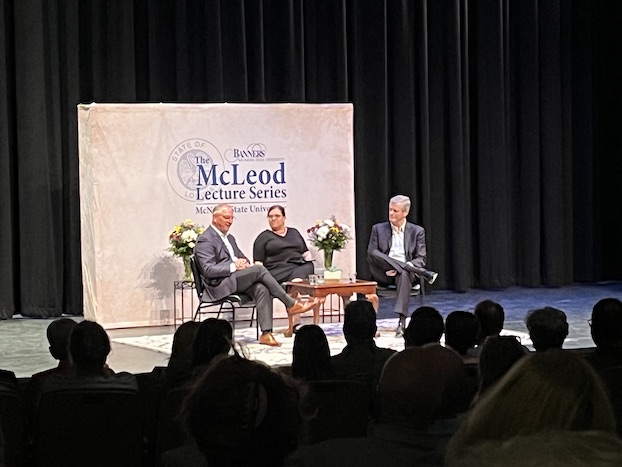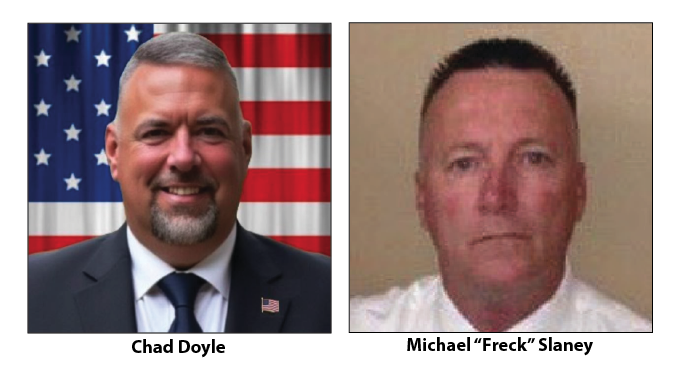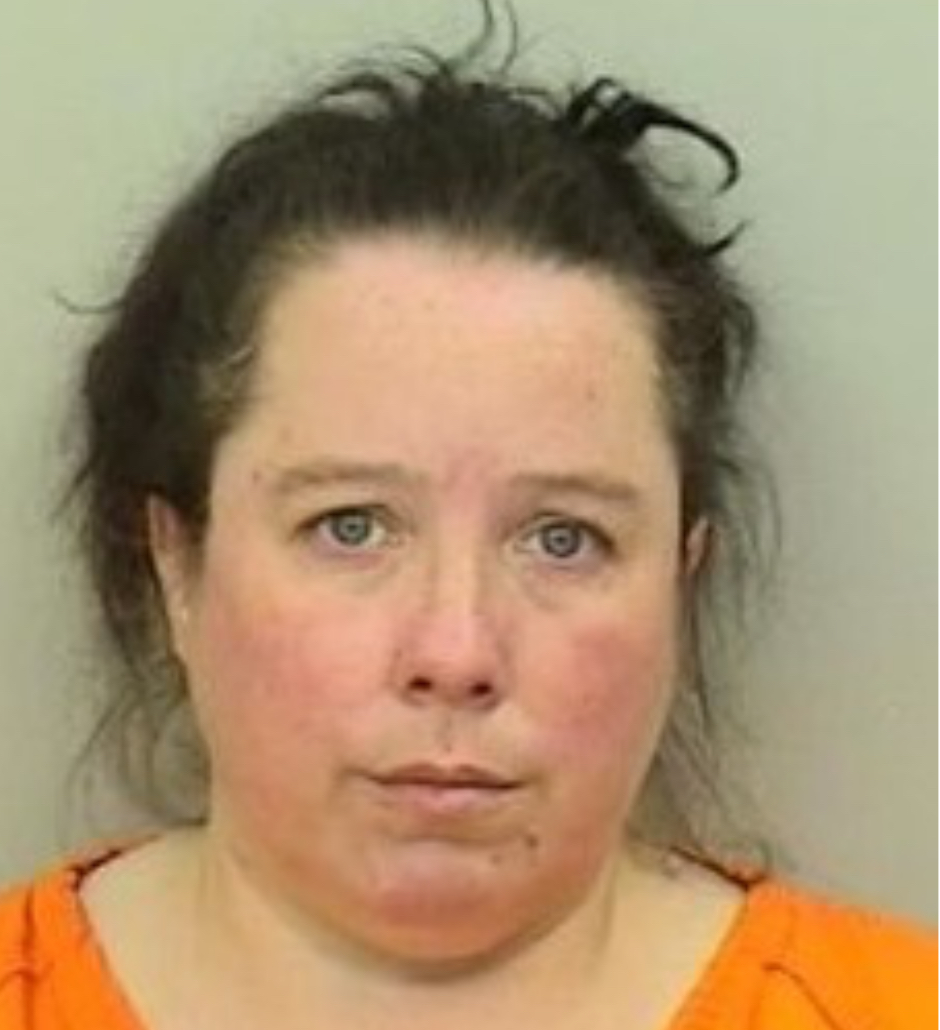McLeod Lecture: Former governors say trust, compromise key to their successes
Published 2:22 pm Wednesday, April 30, 2025

- Stephanie Grace, editorial director and columnist for The Advocate, served as the moderator Tuesday night for the McLeod Series lecture that featured former governors John Bel Edwards and Charlie Baker. (Crystal Stevenson / American Press)
Building trust by being honest with people and being willing to compromise are key attributes of being successful in government.
That was the message Tuesday night during the McLeod Lecture — part of McNeese’s Banners cultural series — which featured former governors John Bel Edwards, a Democrat, and Charlie Baker, a Republican.
Baker is now president of the NCAA (National Collegiate Athletic Association), and Edwards is practicing law with the Fishman Haygood firm of Louisiana, focusing on renewable energy matters.
Trending
During the their time leading their states, both worked with majority legislative bodies of the opposing parties. On Tuesday both shared lessons learned on how to cross the aisle to bring people with opposing views together.
Party affiliation
Baker said he grew up in a home with a divided party affiliation — his father was a Republican and his mother is a Democrat.
“They used to debate the issues at our dinner table on Sundays and I used to have friends who would come over just to watch,” Baker said with a laugh. “Basically, if you were going to sit at the table you had to play. My parents weren’t fighting they were just having conversation so I grew up with this perspective that the two people I love most didn’t vote for the same people, agreed sometimes and didn’t agree a lot of times, but I never thought it was a contest or a fight.”
Baker said he ultimately became a Republican because when he became old enough, the presidential choices were Ronald Regan and Jimmy Carter.
“Reagan was my candidate of choice in that election,” he said. “Then over the years I got involved in state politics and supporting a number of Republican candidates — including two Republican governors I worked for in their cabinets.”
Trending
Edwards also attributes his party affiliation to his parents’ influence.
“My dad was a sheriff, like his dad and his grandfather and his great-grandfather, and my mother was a charity hospital nurse,” Edwards said. “They were both very much Democrats. That just wasn’t debated at all.”
Edwards said there are a number of Republicans who believe the government is always bad, it cannot work and it cannot be fixed.
“If you put those people in charge of government, it becomes a self-fulfilling prophecy and you see exactly what we’re seeing now in Washington,” he said. “I just cannot be a Republican even though my party has oftentimes found considerable fault with me.”
Relationships
Baker served as the governor of Massachusetts from 2015 to 2023 and held cabinet positions under two of the state’s previous governors.
“I knew a ton of people based on my time in state government and I had real relationships,” Baker said. “I had professional relationships, personal relationships, and I worked with these people on all kinds of issues. They might have been Republican or Democrat, but I never really looked at them that way. I looked at them as a person I knew.”
These types of relationships give local and state governments “a little bit of an edge” over the federal government.
“It’s easier and, I think, more traditional to have relationships — personal ones — with a lot of people you work with,” he said. “You’re just around each other all the time. That makes a big difference, in my mind, of how we got things done.”
Edwards agrees.
“Personal relationships make all the difference in the world and it’s still the case in Louisiana that you can have good, personal relationships with people in the other party,” Edwards said. “The biggest impediment to having personal relationships with people of the other party is if you ever develop contempt for people just because they are in the other party. If you have contempt for somebody, you have no interest in sitting down with them. You don’t care what they think. You don’t really want their support for what they’re trying to do. Trying to avoid that level of contempt, I think, is one of the most important things.”
Baker said there were a lot of people he worked with while in government that he could trust. He hopes they felt the same of him.
“I could tell them exactly what I thought, why I was trying to get something done and I could say to them, ‘I can help you on this. I cannot help you with that. I’m willing to do this. I’m not willing to do that.’ I wasn’t playing games. If you want someone to help you do something hard and it’s challenging and difficult, if you don’t trust the people you’re trying to do this with your chances for success are not going to be very high.”
Trust is a currency in and of itself, Baker said.
Bipartisanship
During the entirety of Edwards’ time in the governor’s mansion, the Republican Party had the majority in the House and the Senate.
“I’m very comfortable and happy by what we were actually able to do — all of it on a bipartisanship basis,” he said. “But some folks would go home after the session and brag about not just what we accomplished but what they voted against. They were always in the minority, though. It didn’t matter if they thought it was something good for the state, if I proposed it and if it was going to happen on my watch they would just as soon not have it.”
Those are the people he didn’t spend a lot of time with, Edwards said, because he knew he wouldn’t win an argument.
“The time you spend with them trying is time you’re not spending with those people you might be able to influence,” he said.
Edwards said he tried during his term to not emulate in Baton Rouge what was happening in Washington, D.C.
Baker said if there were other legislators in government who wouldn’t support something he was passionate about, he would find someone else to sponsor the legislation.
“I’m perfectly happy with someone else taking all the credit because at the end of the day I don’t care that much about that. I care whether that item actually makes it,” he said.
Weather woes
Baker was sworn in on Jan. 4 and during his first press conference on Jan. 20 he unveiled his budget plan.
“One of the questions I got asked at the press conference was if I put enough money in for snow removal. I said, ‘It’s 50 degrees outside. There’s no snow on the ground. It’s almost the end of January. I think we’ll be fine.’ On Jan. 28 it started snowing and it snowed 38 days in a row and the temperature never got above 25.”
His approach during that time was to host press conferences three times a day to give updates.
“We did everything we could to give people guidance on what we were doing and why we were doing it and one thing people said after was they appreciated that we brought local folks to talk about particular problems in their communities and we didn’t make it seem like it was about us,” he said.
Baker also called mayors and asked what they needed — and had it delivered.
“If people see government actually responding quickly and aggressively to the problems that are there and not creating them it helped us make a first impression,” he said.
Edwards said in March of 2016 — when he was governor for just two months — an afternoon storm came in and didn’t leave for seven days.
“That was my first disaster and it became a federal disaster declaration,” he said. “By the time I left office, we had 23 of those. FEMA brought down a special presentation because no other governor has ever had 23 major federal disaster declarations before.”
Edwards said he did his best to communicate effectively, tell the facts as he knew them, and remain calm.
“It’s not enough to speak so that you can be understood you’re supposed to try to speak so you can’t be misunderstood.”





